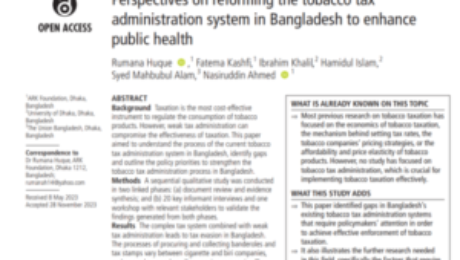Abstract Introduction The burden of multimorbidity is recognised increasingly in low- and middle-income countries (LMICs), creating a strong emphasis on the need for effective evidence-based interventions. Core outcome sets (COS) appropriate for the study of multimorbidity in LMICs do not presently exist. These are required to standardise reporting and contribute to a consistent and cohesive
- Published in Journal Article, Resources
No Comments
Exposure to secondhand smoke (SHS) risks children’s health. However, biomarkers are rarely used to study SHS exposure among children in low- and middle-income countries. We analyzed cross-sectional data collected between March and November 2022 for a cluster-randomized controlled trial investigating a Smoke-Free Intervention in 2769 children aged 9–15 in 74 schools (34 in Dhaka, Bangladesh,
- Published in Featured, Journal Article, Resources
The burden of multimorbidity is recognised increasingly in low- and middle-income countries (LMICs), creating a strong emphasis on the need for effective evidence-based interventions. Core outcome sets (COS) appropriate for the study of multimorbidity in LMICs do not presently exist. These are required to standardise reporting and contribute to a consistent and cohesive evidence-base to
- Published in Journal Article, Resources
Consumption of sugar-sweetened beverages (SSB) is a major global public health problem. Increasing the price of SSBs through taxation is an effective tool to reduce SSB consumption. Price-elasticity estimates are useful in measuring the effect of taxation on consumption. We estimated the own price elasticities of demand for SSBs in Bangladesh, which will inform how
- Published in Journal Article, Resources
Bangladesh has 22 million adult users of smokeless tobacco (ST). The prevalence among women is higher (24.8%). Health-related quality of life outcome (HRQoL) for ST use is little known. We investigated the association between HRQoL and daily ST use among adult women in Bangladesh. PDF Version | HTML Version
- Published in Journal Article, Resources
Taxation is the most cost-effective instrument to regulate the consumption of tobacco products. However, weak tax administration can compromise the effectiveness of taxation. This paper aimed to understand the process of the current tobacco tax administration system in Bangladesh, identify gaps and outline the policy priorities to strengthen the tobacco tax administration process in Bangladesh.
- Published in Journal Article, Resources
Background: People with severe mental illness (SMI) die earlier than the general population, primarily because of physical disorders. Aims: We estimated the prevalence of physical health conditions, health risk behaviours, access to healthcare and health risk modification advice in people with SMI in Bangladesh, India and Pakistan, and compared results with the general population. Method:
- Published in Journal Article, Resources
Background: Community engagement (CE) interventions often explore and promote behaviour change around a specific challenge. Suggestions for behaviour change should be co-produced in partnership with the community. To facilitate this, it is essential that the intervention includes key content that unpacks the challenge of interest via multiple sources of knowledge. However, where community lived experience
- Published in Journal Article, Resources
Abstract: Obesity is one of the major contributors to the excess mortality seen in people with severe mental illness (SMI) and in low- and middle-income countries people with SMI may be at an even greater risk. In this study, we aimed to determine the prevalence of obesity and overweight in people with SMI and investigate
- Published in Journal Article, Resources
Abstract Introduction: People with severe mental illness (SMI) are more likely to have obesity and engage in health risk behaviours than the general population. The aims of this study are (1) evaluate the effectiveness of interventions that focus on body weight, smoking cessation, improving sleeping patterns, and alcohol and illicit substance abuse; (2) Compare the number
- Published in Journal Article, Resources










